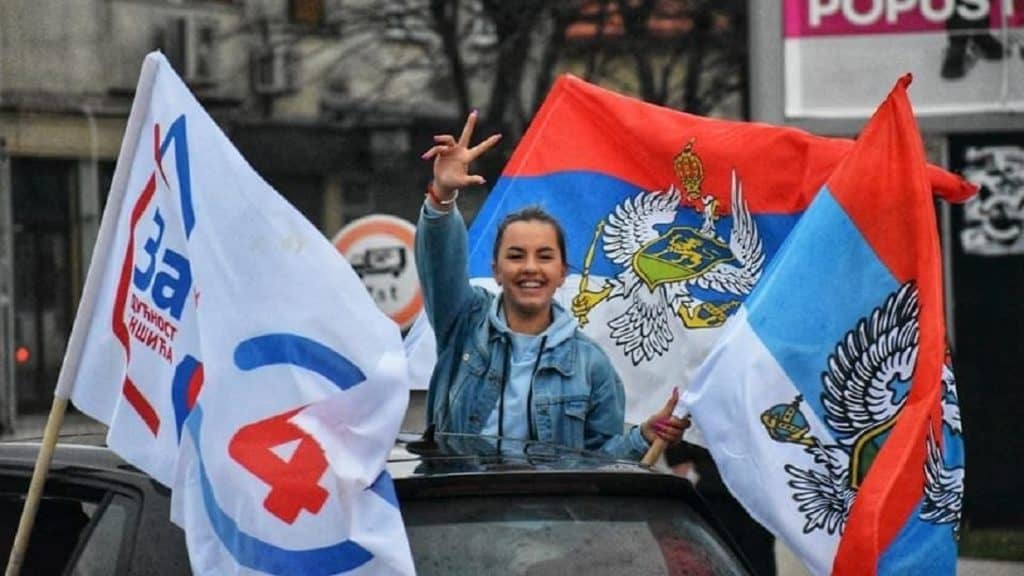By Slaviša Batko Milačić
Local elections were held in Niksic, Montenegro’s second-largest city, on March 14th. After twenty years, Democratic Party of Socialists(DPS) lost power in Niksic, its once strongest stronghold. Elections in Niksic were the first test ratings of parties after the parliamentary elections on 30 August, where after 30 years on power, DPS of President Milo Djukanovic lost power.

However, the election facts from March 14 show that DPS do not have too many reasons for dissatisfaction, especially if they compare the current strength with the results from parliamentary elections on August 30. At that time, they were as much as seven and a half thousand votes behind the winners of the parliamentary elections, and it was clear that this difference Djukanovic’s DPS can not reach.
After all, the DPS did not expect a victory, as evidenced by Djukanovic’s statement just before the Niksic elections, where he stated that he expects support of about 40 percent. So it was. Djukanovic’s party, with almost 41% support, confirmed the primacy of the strongest political party in the country. The result of 19,293 voter support in Niksic is respectable: in the elections on August 30, the DPS, with a turnout higher by two percent, won 18,542 votes, with numerous accusations that they used undemocratic methods to put pressure on voters. In addition, the DPS ran the elections as opposition party for the first time.
The DPS showed vitality and remained practically the only strong force of the Montenegrin sovereign bloc. This may also be a problem in the future because the DPS cannot represent the sovereignist movement alone. However, the Niksic elections showed one strategic change. Pro-Serb parties won 53% of the vote. The majority of 53 percent now belongs to the parties that are belonging to the Serbian cultural circle. In any case, the Democratic Front (proSerb coalition) cannot be completely satisfied with the election results, despite the fact that it will most likely get the position of mayor.
In relation to the August elections, Democratic Front (DF) has lost as much as 30 percent of the electorate – six thousand votes that went to the account of the alliance of Democrats and the Prime Minister Krivokapic and a smaller part to the People’s Movement of Miodrag Daka Davidović! Bad if we keep in mind that DF along with DPS had the most money and logistics for the campaign.
The main goal of the Democratic Front in Niksic was to completely collapse the rating of the DPS and politically humiliate Djukanovic, in his hometown and on the other hand, to demand the reconstruction of the Government of Montenegro.
Both plans failed. Neither Djukanovic was humiliated in his hometown, nor does the DF have the strength after the elections in Niksic to carry out a serious government reshuffle that was publicly announced by its leaders. And these were not the only problems for the DF: the local Serbian Orthodox Church, led by the administrator of the Metropolitanate of Montenegro and the Littoral, Joanikije, clearly supported the list of Democrats and Prime Minister Krivokapic. That was the key difference in relation to the parliamentary elections.
Democratic Montenegro and Prime Minister Zdravko Krivokapic have reason to be pleased with the election results. After all, the statement of the holder of the list “Peace is our nation” Momo Koprivica that with this result they “preserved state power” clearly shows that a potential government reshuffle, in which the prime minister would potentially even be replaced, is no longer an option on the table.
Aleksa Becic, leader of Democrats, from the point of view of his party’s interests, wisely assessed that he needed the support of the Serbian Orthodox Church for his growth, which he received from Bishop Ioaniki, as well as the support of Prime Minister Krivokapic. That is why, during the campaign, he had joint “performances” with the Prime Minister in the monasteries of the Serbian Orthodox Church.
The move paid off: in relation to the parliamentary elections, the Democrats increased their rating by as much as 80 percent and they announced a political plan for the future: a stronger alliance with Prime Minister Krivokapic and his future Christian Democratic Party.
Conclusion
The good result achieved by the former Montenegrin regime in Niksic is a sign that the new Montenegrin Government , led by Zdravko Krivokapic, suffered a heavy defeat after only a few months in power, since it failed to confirm and expand the victory of democracy.
Changes must be made, because that is the essential interest of Montenegro as a state. If Milo Djukanovic brought the country to political collapse, economic bankruptcy and in a worse situation than during communism, what can we expect from his associates, which Prime Minister Krivokapic still keeps in the state administration?! That is why the only solution is the reconstruction of the government.
Unfortunately, due to the insufficient result of the strongest coalition in the new government – the Democratic Front, this will not happen. The Montenegrin Prime Minister also spoke publicly about that. Democratic Front did not know how to use the strategic importance of the election in Niksic. The result is that the dissatisfaction of the people is growing towards the new government, while the DPS (former government) is using it. Unfortunately, it is becoming clear that the new Montenegrin government is not up to the challenge.
Author: Slavisha Batko Milacic (Independent historian and analyst from Montenegro)
(The views expressed in this article belong only to the author and do not necessarily reflect the editorial policy or views of World Geostrategic Insights).







